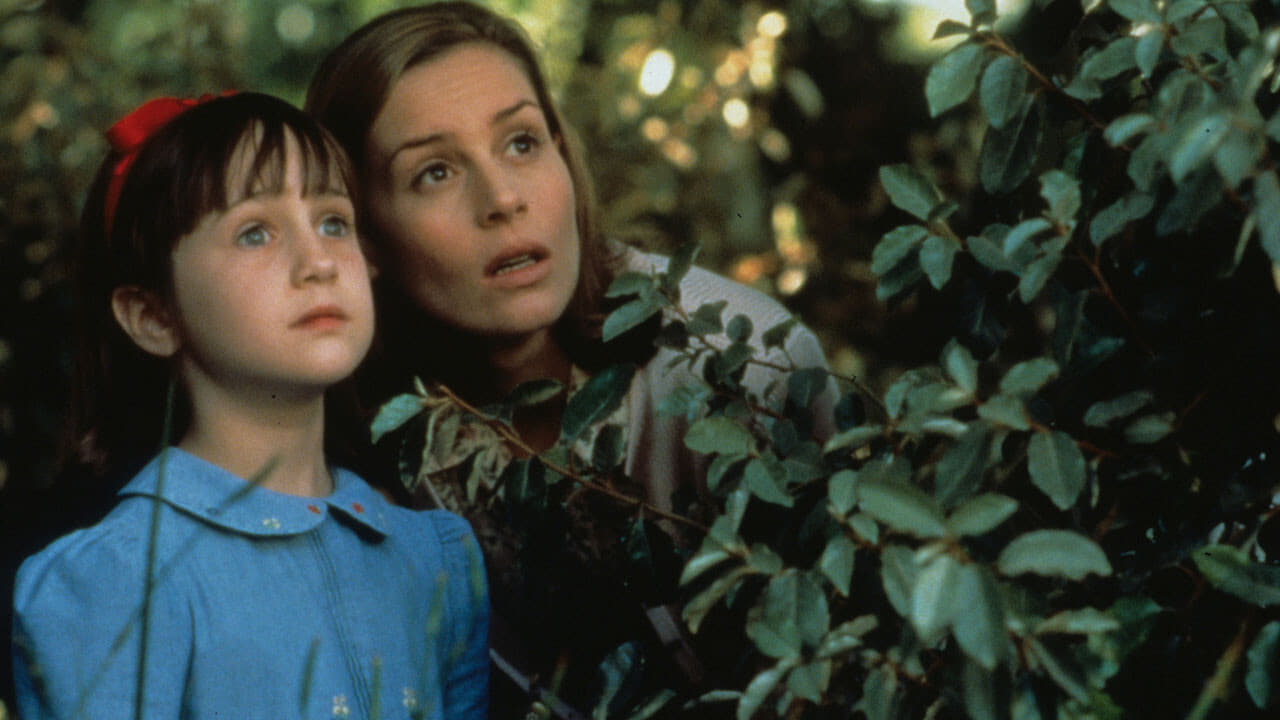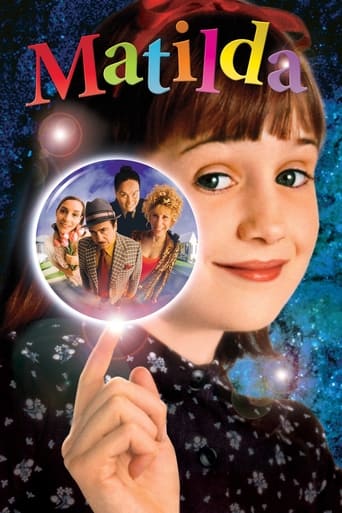Mihai Toma
A young girl, neglected and underappreciated by her family, is sent to a local school with a nightmarish principal. Her unique character, her extraordinary intelligence and some newly found powers, make her easily remarkable and with the help of her teacher, with a troubled past of her own, are about to radically change her live forever.It's a wonderful movie, filled with laughter and joy, which presents a small portion of a girl's life, who once sent to school, is about to find out that there is a real life out there to be found, quite different to those she found in the books. The school's principle and her family seem determined to make her life unhappy and hard, but her lovely teacher will always be there for her.We're presented a bunch of unique characters, who manage to generate laughter with almost everything they do, thanks to their way of being. The plot is unique and interesting, but not groundbreaking, managing to keep the viewer interested until the end. I have to admit that the movie tends to exaggerate in a couple of aspects and it's up to you to decide if this is for good or for worse. From where I'm standing, it uses this "feature" to emphasize certain aspects of the plot, which ultimately lead to a great atmosphere, full of laughter and joy. The special effects used are also very good, considering its time, contributing a lot to the outcome especially in the last part.It's the perfect film to watch with your family. It has great characters, great actors, a good plot, plenty of happiness, a bit of drama and much comedy. Even after seeing it multiple times throughout the past twenty years, it still managed to be a very good watch even now, when I almost know the plot by heart. The feelings it transmits cannot be translated into words and the fact that it made me feel this way every single time I've seen it makes it a superb movie.
jaywensley2004
Roald Dahl wrote books and stories that could inspire and embolden children (and for that matter, adults) to challenge a daunting world in which bullies, tyrants and other malefactors would seek to oppress and manipulate them. "Matilda" (the book) is a tour de force by the author, presenting his "child-empowering" politics in the most realistic, relatable setting of any of his most popular novels."Matilda" the movie grinds Dahl's crafty, subversive story and his ability to write such a story into "Nightmare on Elm Street" for the grammar school and pre-teen set. Dahl's novel, which with its scant, succinct, read-in-a-couple-of-hours subtlety, nuance and subversion matches the entire "Harry Potter" canon, is ironically the victim of the very authoritarianism it encorages subverting. "Matilda" the movie contains so many revisions and diminishments to and of Dahl's story as to be a completely different tale. The text "Based on..." in the credits of a movie has become so common that few people give any thought to the source material. In the case of "Matilda" the movie vs. "Matilda" the book this is not only unfortunate, it is a dis-service to their children and to any parents who value having their children learn, understand and engage in critical thinking. And the possible "Spoilers" begin:---1)"Matilda" the book: Matilda is the daughter/sister of shallow, materialistic, vacuous parents and brother; the worst possible common-denominator of the "Me Generation" of the 1980's. They are not the inevitable result of their era, the Wormwoods have made choices that result in both their vapidity and perhaps as counter-balance, Matilda. ---1A)"Matilda" the movie: Matilda is the daughter/sister of cartoons. One-dimensional, stupid to the point of begging the viewer to question how such adults could achieve adulthood much less be thriving, these caricatures raise the first of many questions: Where is the cleverness, the craftiness Dahl provides the Wormwoods? ---2)"Matilda" the book: Matilda's reading exposes her to thought processes, ideas, concepts, motives not generally available to elementary school age children. Her favorite author is Charles Dickens, and from him and other writers she develops an intuitive understanding that the world is not in balance. ---2A)"Matilda" the movie: Matilda reads voraciously, but what does she learn from that reading?---3) "Matilda" the book: Ah-Ha! A critical idea emerges; Matilda, through her reading has obtained crucial insight into adult motives, behavior, actions. She develops the understanding that size and age are not impervious barriers to ethical and moral actions. ---3B) "Matilda" the movie: Matilda is inspired by her amoral, criminal father to consider the possibility that she (a child) is as much a person (and therefore as powerful) as any adult.An aside: Which is more potent, more effective, more persistent, sustainable? Insight or information?---4) "Matilda" the book: Matilda makes scant use of her "powers." ---4A) "Matilda" the movie: Matilda dances about, moving furniture, controlling electrical switches, ad infinitum... and directly relevant to... ---4.b) "Matilda" the book: the first time Matilda seeks to demonstrate her powers to Miss Honey, she succeeds. Miss Honey is never, ever doubtful of Matilda's abilities. ---4.A.b) "Matilda" the movie: Matilda is unsuccessful in her early attempt to demonstrate her ability to Miss Honey. And the "Hollywood-ization" of "Matilda" takes it first big step.---5A) "Matilda" the movie: the entire, long, drawn out episode of Matilda psychically invading Trunchbull's (yes, I know) house is contrived. No version of it exists in Dahl's book. This sequence is the most shameless, pandering and demeaning scene in the film (although it has credible competition for this dishonor). ---5) "Matilda" the book: Nothing like this scene occurs in Dahl's novel, for good reason. Matilda's power, its existence and her use of it is, as will be evidenced at the story's end, purposeful, deliberate...righteous.An aside: In "Matilda" the movie Matilda has magic powers which she maintains after the story's climax. In "Matilda" the book, Matilda is never able to manifest her telekinetic ability after she rectifies the wrongs committed against Miss Honey. I suggest that the movie's ending is much less "spiritual" than Dahl intended.---6) "Matilda" the book: Having overcome Trunchbull and redressing the wrongs committed against Miss Honey, Matilda never again manifests her telekinesis, suggesting the ability was specific to a situation...that is, spiritual. ---6B) "Matilda" the movie: Matilda continues to demonstrates telekinetic ability, which would beg the questions "What will a human with such power do?," "How will Matilda affect and influence the world?," etc., etc., etc..And lastly, but not "leastly:"---7B) "Matilda" the movie: In Dahl's book Matilda is never mean or malicious. The treatment of Trunchbull at the film's climax depicts an act of vengeance severely out of character with Matilda's nature and her manifestation of her telekinetic ability. It is consistent with the "Hollywood-ization" of the story in that it provides a slapstick, child-pleasing and child-accessible conclusion. ---7A) "Matilda" the book: Matilda earns an understanding of empowerment, but also learns that the power she had and used was a metaphor for being responsible, intelligent, clever, wise, compassionate...all the traits she sought in the adults around her.Even granting that the movie versions of books are generally criticized for the liberties, variances and accommodations that are part of "getting the movie made," Matilda, the movie, is too much a violation of its source to be worthy of viewing.
d-r-oestreicher
Matilda is born into a difficult situation (remember this is a comedy) with arguably the worst (not physically abusive) parents ever, from when they drive her home with the car seat sliding around in the back of their station wagon, to her mother denying that she is old enough to go to school, so Matilda can stay home to receive packages (of stolen car parts) - remember? comedy!The parents are played perfectly by Danny DeVito and Rhea Perlman - two comic geniuses.But the star is Mara Wilson as Mitilda, the little girl who takes care of herself and teaches herself to read, and through this self-determination and READING, she saves herself. An excellent role model for any child. An excellent film to rent for National Library Week in April.

